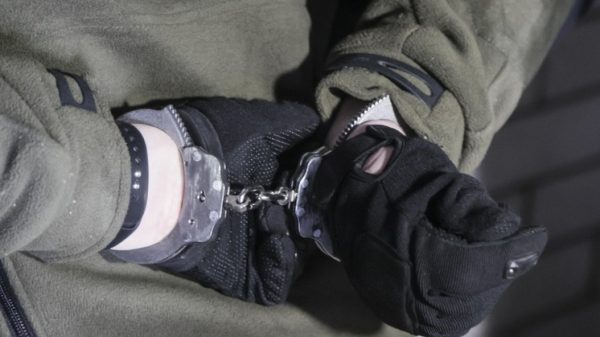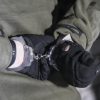“There is beauty in darkness,” Bilal Fawaz says with a poetic flourish as we sit on an old bench outside the Cricklewood Boxing Gym in this stark corner of north-west London. “I became best friends with darkness and pain a long time ago.”
The sky is sombre, with black clouds rolling in, and Fawaz talks with electrifying force. He is a newly professional boxer but his past is haunting and his future uncertain. Fawaz was abused as a boy in Nigeria and then trafficked to London.
It took him 16 years to win the right to remain legally in the UK but, despite being stateless, Fawaz fought six times for England and won the national ABA light-middleweight title in 2012.
He believes he would have fought for GB in the 2012 and 2016 Olympics had he not been a refugee.
He is now 32 and finally able to fight professionally. Yet, despite signing a deal in September with MTK Global, the management company which has more than 300 fighters on its books, led by Tyson Fury, Fawaz has entered another lockdown in destitution. He did not receive a penny when joining MTK and, while waiting for his pro licence to be granted by the British Boxing Board of Control, he will not make his paid debut before next February. Fawaz is worried he could end up being homeless again.
How a champion boxer got caught in Britain’s immigration dragnet
Read more
“I’m not easily scared,” he says with a sudden smile. “Every key on the piano makes a sound. Even the sad keys make a beautiful sound. And the happy keys sound really good because without the sadness you would not appreciate them. I’ve been through adversity but it gives me strength to look forward.”
Fawaz was held in detention centres twice by the Home Office as it tried to deport him and, while he tells me about being so depressed that he cut himself, it was amid incarceration that he learned to play the piano. Boxing and piano-playing, to Fawaz, both offer hope. “It’s a different journey but the same destination. Three plus four is seven. Eight minus one is seven.
“Different journey, same destination. Whether it’s boxing or music, I feel the same sensation.”
When did he last play the piano? “Yesterday. When I play I feel tranquillity. It’s the same feeling whenever I write music or I’m in the ring and everything flows perfectly. You should hear me play. I’m good. I can make you cry on the piano.”
When I was a kid in Nigeria my mum beat me to the point where I was bleeding. She took her depression out on me
There are heavy black tyres, rather than a piano, in the barren grounds surrounding the gym. Fawaz uses a sledgehammer to pummel the tyres but now, deep in conversation, we return to a darker violence. “When I was a kid in Nigeria my mum beat me to the point where I was bleeding on several occasions,” he says. “She took her depression and regret out on me. She was too young to have kids so she had emotional problems.”
Fawaz’s mother came from Benin and, as he says, “My dad is Lebanese. I didn’t see him because he was a businessman. He never spent a significant amount of time for me to feel I had a dad. He had his own family.”
The beatings scarred him – as did the bullying in school in Lagos. “I’m too black to be called white and I’m too white to be called black. I was the odd one out and people would say: ‘Go back to your country.’ I would tell them: ‘I was born here. I’ve never been anywhere else.’ But they bullied me and treated me as an outcast.”
Fawaz was taken from his mother by a man claiming to be his uncle who promised to reunite him with his father in London. “It was all malarkey and shenanigan. I was trafficked into this country when I was 14 and kept in a house in London. I felt like a slave because I wasn’t allowed to leave. I couldn’t go to school or the shops. I was slapped, beaten with a flip-flop, and told I had to clean the kitchen and do everything in the house. I eventually escaped and someone found me in the street, crying. They took me to social services.”
While he was in care Fawaz was introduced to boxing. He showed a natural aptitude and after a few months he was beating fighters who had boxed for years. His talent was nurtured and after years of work he became England champion in 2012. He even fought for England against Nigeria but he remained stateless. Fawaz recalls sparring Josh Taylor, the current IBF and WBA light-welterweight world champion: “Taylor is the best in the world. He uses his intelligence and when we sparred you could see our similar attributes. So I would definitely have fought in the Olympics if I was allowed. I was England champion and London champion at different weights.”
His hopes of turning professional were blocked by the struggle to remain in the UK once he turned 18. Frank Warren and Barry McGuigan wrote letters of support to the Home Office – with Warren suggesting Fawaz would earn around £230,000 within his first two years as a pro. The Home Office remained determined to deport him to Nigeria.
“But my father had never registered my birth in Nigeria,” he explains. “So the Nigerian Embassy said I’m not Nigerian. The Home Office arrested me and took me to a detention centre. They released me after a while due to my mental condition. But they locked me up again one year later. It was the same agenda and the Nigerian Embassy said: ‘Why are you bothering us? This boy is not Nigerian. Look at his name and complexion. He has fought for you and you are trying to deport him.’ My father had died so I couldn’t claim any citizenship with Lebanon either. I belonged nowhere.”
I started practising the piano. I miss the keys. The next day I was better … then one day I can play the sequence
There were positive moments in detention. “Everyone was invested in PlayStation but I saw the music room which no one used. I started practising the piano. I tried a certain sequence. I miss the keys. The next day I was better. Then, one day, I can play the sequence. Practise and persistence.”
He recently released a short album of his music, under the name Statelezz, but his detention was mostly troubling. Fawaz shows me the scars on his upturned arms and wrists. “It was very depressing because I was locked in a room. It was the same sensation as my mum and dad abandoning me or when I was brought here as a kid. I felt worthless. I started cutting myself with a blade from a shaving stick. The real pain was inside me. I had fought for this country in the ring and they still said: ‘We don’t want you here.’
“I was in excruciating pain emotionally and I couldn’t relinquish the frustration. They say the same part of your brain lights up when you’re hurt both emotionally and physically. So I cut myself and blood came out of my arm. I felt relief but, of course, it didn’t last. Cutting yourself is not good but I was on medication. The Home Office knew about it and still locked me up. They inserted a dent in my life and mental health. They took away my best years of boxing and it was an unlawful detention.”
Former England boxer Kelvin Bilal Fawaz wins 16-year battle to stay in UK
Read more
Fawaz’s life changed in June when, while sitting on a bus in London, he took a call from his immigration lawyer. He had been granted leave to live and work in the UK for at least 30 months. His face lights up. “I never had that feeling before. It was unfamiliarly pleasant. It felt like a square because I was complete at last. Every corner was connected. I pressed the button on the bus and ran out. I kissed the ground. I didn’t care about coronavirus. I was crying. Until then I was just a number to the Home Office: F1289212. It’s no surprise I was depressed and they prescribed me medication in hospital.”
Is he still on medication? “No. I’m OK now.”
All morning, despite the bleak memories, Fawaz has had such a spark about him. Whipping off his shirt he turns to Tom Jenkins, our photographer, and beams. “Catch my sass, bro.”
Fawaz could be a star if he can perform in the ring as grippingly as he talks. But he is still struggling and in dire need of help. “I had to pay £160 for my professional licence and I have £5,000 arrears owing on my accommodation. I couldn’t pay rent because of the coronavirus. They threatened to kick me out and if they do that where am I going to stay? I have nothing tangible until my pro debut.”
How is he managing to live? “People give me donations, £50 here and there. I do some personal training but that’s stopping because of coronavirus. I really need a sponsor because life is very hard. I smile a lot but it hurts. There is so much uncertainty. They could issue an eviction notice and say: ‘Bilal, sorry, we can’t accommodate you.’ But worrying does not change a problem. It only enhances it. It’s what you do about it that matters.”
What kind of fighter is he? “I’m a strategic boxer. I box like Muhammad Ali whether I dazzle or set traps like a hunter. If you chase a rabbit around the forest it’s going to outrun you. But if you set a trap, and wait, it will fall into your control. My ambition is to become world champion. That’s guaranteed. I’ve sparred with Mikkel Kessler, Josh Taylor, Billy Joe Saunders, so many big names. Four weeks ago, Billy Joe turned around after sparring eight rounds with me and said: ‘This boy is going to be world champion.’”
Nothing can stop a man of conviction. If you believe you can do something, you will do it. We are amazing creatures
There are times when Fawaz reminds me of Chris Eubank Sr – even if there is less artifice to him. He laughs. “I used to be bad, talking like: ‘Innit, you get me big man, blah blah.’ But I’ve trained myself to speak in this manner which is different to the streets. I decided to change my demographic. I wanted to hang around civilised and motivated people.”
Fawaz seems certain that boxing is only the start of his newly legal life. “I’ve perfected the art of boxing but I don’t really like punching people in the face and making them bleed. Once I become world champion, acting will become my priority. I can evoke such emotion. I can cry on cue. I could cry right now.”
He laughs instead. “Nothing can stop a man of conviction. If you believe you can do something, you will do it. We are sentient beings. We are amazing creatures. We just need to use our brains more. Many people don’t know how to strategise, how to articulate, how to put things into perspective. When they see an obstacle, they are demotivated. When I see an obstacle I am motivated. I believe I will be a world champion and then an actor and, by believing it, it is 50% done.”
Just before we say goodbye, and he opens the dark green door to the gym so he can resume working hard as a boxer, Fawaz says one more simple sentence. He sounds defiant rather than sad: “If you don’t fight for yourself, who will fight for you?”




















































Свежие комментарии